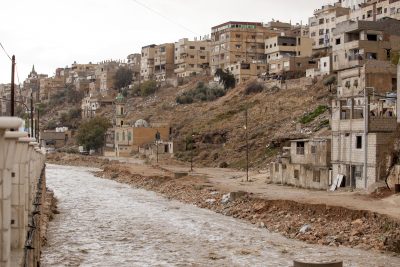
Kyle LaFerriere
A recent paper identifies lessons learned from MCC’s investments in the Water, Sanitation, and Hygiene (WASH) sector such as the Jordan Water Compact, which benefited residents of Zarqa (pictured above) through the water and wastewater network project.
Achieving this mission involves looking inward and seeing what is working and what could be done better. That is the purpose of our Principles into Practice series, which reflects on the agency’s experiences in implementing and evaluating MCC programs in a given sector. The series draws on broader lessons to improve future sector programming and evaluation.
MCC is pleased to announce the publication of a new Principles into Practice paper, Lessons from Evaluations of MCC Water, Sanitation, and Hygiene (WASH) Programs. The findings in this paper apply across multiple sectors and draw from 17 independent evaluations of over $1 billion in MCC investments in the WASH sector.
In the early years of MCC, WASH programs proposed by partner countries were largely guided by the Millennium Development Goals, which focused on increasing access to improved water sources. With the introduction of the Constraints Analysis in 2009—a process that involves identifying the most serious impediments to growth in a given country—we largely narrowed the focus of our WASH programs to urban areas. With a refocused strategy, urban area investments largely aimed to meet water supply demand while increasing economic prosperity. In reflecting on the results from first 15 years of MCC WASH investments, the following broad lessons emerged:
- MCC must clearly articulate the specific problem that a WASH program aims to fix, designing interventions that deliver targeted solutions.
- For a program to achieve and demonstrate success, MCC requires reliable data to better understand and assess program context and results. Data quality and availability issues must be explored during program development.
- MCC must design sustainable programs that generate perpetual, inclusive benefits. These lessons are already being applied to MCC’s most recent WASH investments in Sierra Leone and Mongolia, as well as in the proposed investment in Timor Leste. In Sierra Leone, for example, the utility management tool known as AquaRating was used to address the need for better utility performance data and the program used a ‘learning by doing’ approach to sustainably build job capacity for utility staff.
Success stories from MCC’s WASH work
MCC’s WASH programs in Jordan and Mongolia are perfect examples of MCC partnered in water-scarce environments to sustainably increase water supply to meet demand. With limited access to surface water or naturally-recharging aquifers, Jordan ranks among the world’s five most water scarce countries, with renewable freshwater resources that total only 150 cubic meters per person per year. This situation continues to be further exacerbated by rapid population growth, urbanization, an influx of refugees, and other factors. In response to this, MCC invested in a compact designed to increase water supply by: (i) improving water delivery systems and reducing water losses; and (ii) introducing wastewater reuse for agriculture by expanding wastewater collection and treatment capacities, and thereby releasing the large quantities of raw water used by agriculture for urban consumption. By allowing wastewater to be used for agriculture, these investments expanded the supply of water available to households and businesses and set the foundation for sustained economic growth.The Mongolia Water Compact was designed by MCC to address the growing water supply needs of Ulaanbaatar City. The city relies on a surficial, or shallow, aquifer that is seasonally recharged by the Tuul River for its drinking water and to supply its combined heat and power plants. Progressive changes in climate and global warming have impacted the river flow during summer months and consequently, the groundwater quantities. The Government of Mongolia implemented restrictions in water use by regulating draw downs in their municipal and industrial wells. These restrictions would sometimes result in a bulk water supply shortage for the city. Since climate change impact is progressive and becoming more frequent, government restrictions too would become more common and further aggravates the availability of water. By providing treatment for new groundwater wells located in the river basin downstream of the city’s municipal wastewater treatment plant, city residents will be able to utilize water sources that are currently unusable due to quality issues. This will allow sustainable recharging of the aquifers currently under stress. The compact will also fund a wastewater recycling (reuse) plant that will further treat the wastewater supplied to power plants for operational use, allowing for the release of large quantities of groundwater for municipal consumption.
Focus areas for future learning
Given the impact water scarcity has on economic growth, and the number of countries and cities that are or will soon face water shortages, MCC’s WASH principles into practice paper presents both lessons learned and focus areas for future projects. The learning agenda focuses on better understanding how to increase a city’s or region’s capacity for providing sustainable water and sanitation services. These include:- Exploring how MCC might incorporate the impacts of water scarcity within constraints analyses.
- Analyzing the impacts of climate change on future water availability and access.
- Exploring how to understand and model the economic impact of water scarcity.
Read the full report. A shorter issue brief is also available.

